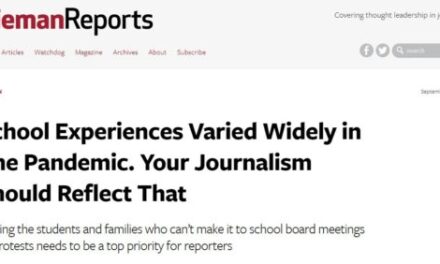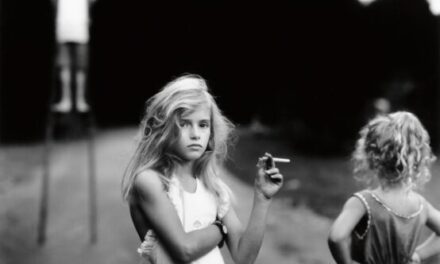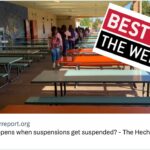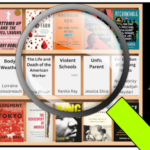A crib sheet for the national education writers conference
By Alexander Russo
Maybe you got into Los Angeles late – thanks, East Coast storm! – and it feels like being late to school on the first day or missing orientation.
Meanwhile, the Education Writers Association (EWA) conference agenda prints out to 15 pages. It’s overwhelming, to be sure.
Not to worry. If you’re going to #EWA18, or you’re planning on following along and commenting from afar, here are some key things to keep in mind, along with 11 panels that seem particularly interesting and useful to me. We’ve got you covered.
You can’t do and see everything this week, but here are 11 panels I think are likely to be particularly interesting (and why) – plus some past columns from The Grade that might help deepen your understanding of what’s going on behind the scenes — along with some conference tips and job announcements.
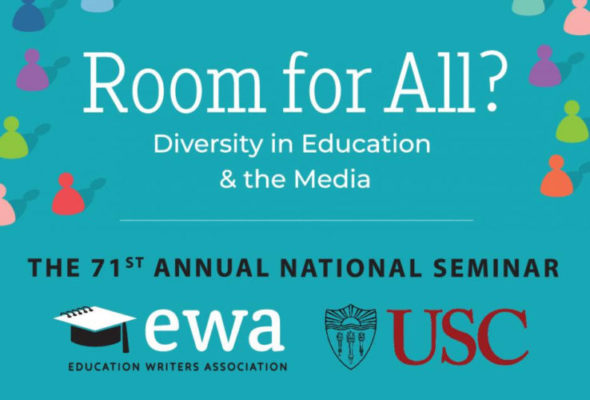
This year’s conference features timely information, much-deserved celebration, and necessary self-reflection.
WEDNESDAY: 5 CAN’T-MISS PANELS
8:50 Big Ideas on Equity, Race, and Inclusion in Education
Most years, the EWA conference is focused on an education issue, rather than a journalistic one. This year’s theme focuses on an issue that affects both education and journalism: diversity in all its forms, in education and in journalism. (The formal title of the conference is “Room for All? Diversity in Education & the Media.”) It’s a new era of self-reflection at EWA, or at least I hope it is.
Coverage from The Grade: Diverse Sources Needed – Regardless of the Topic.
12:45 Diversity in the Journalism Workforce
Two years ago, EWA produced a survey of education journalists and heralded the relatively diverse racial and gender demographics of education reporters compared with journalism overall. As of 2016, the average education reporter was female, 36 years old, white, and had 11 years of journalism experience. EWA has since taken some positive steps toward placing more attention on newsroom diversity (including a task force, a strategic plan, and a recent op-ed calling for progress). This is a make-or-break panel for me, featuring a panel of top speakers.
Coverage from The Grade: Diversity In Education Journalism 2017: A Snapshot.
2:00 Understanding Public School Segregation Data
This session features (among others) Vox’s Alvin Chang, who’s written some great pieces on the topic, including one longstanding favorite about the role that neighborhood attendance zones play in school segregation that you can use as a model for your own reporting if you haven’t already. Charter schools and magnets — all forms of choice, really — play a role in school segregation, sure. But school district and attendance zone boundaries are the largest factors, by far, and have been for decades. You owe it to yourself and your readers to be writing about them. Read Chang’s story about attendance zones’ effects on segregation, which vary widely from district to district, and how to make them work better.
3:30 Covering Schools’ Preparation and Response to Shootings
School shootings are relatively rare, and mass events like Parkland are even more unusual. Please remember to tell your readers that. But gun violence is an issue in student’s lives, and figuring out how to count, portray, and establish district accountability in the aftermath of a school shooting is no easy task. Throw in gun control advocates and alt-right troll armies to the left and right and the job gets even harder.
Coverage from The Grade: Misleading coverage of school shootings.
6:30 National Awards for Education Reporting Banquet
During this event, the winners from among this year’s #EWAawards finalists will be announced from 16 different categories. It’s usually a pretty good event, watching the recognition of colleagues and competitors and hearing them talk about their work. Just remember that some of the awards are given out Thursday at lunch and that some of the best education stories may not be represented.
Coverage from The Grade: Hits and misses from the EWA awards finalists.
THURSDAY: 3 CAN’T-MISS PANELS
9:30 Rethinking Student Discipline
Covering this hot-button issue is one of the biggest challenges of 2018. On Friday, we found out from the Sun-Sentinel that the student discipline system in Broward schools (where the Parkland shooting took place) has been stonewalling reporters and investigators seeking information for the past three months. On Saturday, we found out that the system in place in Broward seems to allow repeat offenders to continue in regular classrooms year after year, their previous infractions purged from their records. On Tuesday, the New York Times reported that Parkland parents were running for school board in part because of lingering concerns that the district could have done more to promote school safety.
Coverage from The Grade: The problem with Parkland [Updated].
1:45 How to Get Funding for Your Dream Reporting Project
There is lots of extra money out there for high-quality education reporting – fellowships, year-long sabbaticals, and the like. Some great journalism that’s come out of these kinds of arrangements. But there’s an argument to be made that the offerings fall far short of meeting the need. Private funding may not be able to save journalism writ large, but it could be doing a lot more to beef up education reporting. In the meantime, get yourself one of these.
Coverage from The Grade: Fixing the fellowship model. The case against the Spencer fellowship
4:45 Transparency in Journalism
Transparency is – along with accountability – a big theme of The Grade. So this panel is important to me. Too many big-name media outlets are reluctant to make corrections (or they make them without telling readers). Too many are reluctant to reflect on their story assignment and reporting processes, taking offense or clamming up when they should reconsider old habits. Maybe here they’ll learn more about engaging with critics and readers, reflecting on their work, and finding areas to improve.
FRIDAY: 3 CAN’T-MISS PANELS
9:00 Covering Race and Diversity in Education
This three-hour deep dive, moderated by the Dallas Morning News’ Eva-Marie Ayala, looks like it’s going to be special. “Two out of the three hours will be dedicated to journalists’ exploring their own implicit biases,” notes EWA head Caroline Hendrie. “One of those hours will be led by a Fault Lines instructor.” As you may know, Fault Lines is the journalism diversity curriculum developed by the Maynard Institute.
From The Grade: Why So Little Diversity Training For Education Journalists?
2:00 How I Did the Story (K-12)
Linda Lutton (WBEZ Chicago). John Woodrow Cox (Washington Post). Aliyya Swabby (Texas Tribune). Talking about their EWA award-winning work. Moderated by the Philly Notebook’s Dale Mezzacappa. That’s really all you need to know.
From The Grade: Best education journalism of 2017
3:15 Reporter Showcase
This is another all-star panel, including Bethany Barnes, The Oregonian; Kalyn Belsha, Chicago Reporter; Ricardo Cano, Arizona Republic, Mark Lima, Fusion, Mackenzie Mays, Fresno Bee; and Linda Shaw, Solutions Journalism Network. They could be talking about Westworld and I would find it interesting. (Well, to be fair, Westworld has gotten a lot more interesting this second season.)
PEOPLE!

You might want to meet Bethany Barnes (The Oregonian), Alvin Chang (Vox), and John Woodrow Cox (Washington Post.
Panels and presentations are great, but even more important for me is the chance to see old friends and colleagues and to meet new people in real life I may not have met or seen in action before.
Some of the many panelists and speakers I’m looking forward to meeting and/or seeing in action include Vox’s Alvin Chang, pretty much everyone on the newsroom diversity panel (Danielle Belton, Jesse Holland, Jon Funabiki, Laurea Castaneda, Francisco Vara-Orta) because I think it’s such an important issue, the Washington Post’s John Woodrow Cox, who writes extraordinary pieces about gun violence, and The Oregonian’s Bethany Barnes, whose ferocious and creative reporting has been a real inspiration lately.
Panelists or otherwise, pretty much everyone who’s anyone will be there. So don’t play it cool. Go up and say ‘hi’ to someone whose work you admire. Maybe someone will do the same to you.
Coverage from The Grade: Favorite education bylines, teams, and outlets for Spring 2018.
PRO TIPS: PICK YOUR FAVORITES
✅ Feel free to ignore all of the above advice and go to timely and well-designed panels on core issues like ESSA, personalized learning, and school finance. We all have to do what we have to do.
✅ The correct hashtag is #EWA18. Don’t try to make #EWA2018 a thing. It will go badly.
✅ There’s a mobile app for those of you so inclined. (There’s also a little-publicized web browser version of the online schedule if you still use a laptop or tablet sometimes.) New to the beat? A great bunch of panels has been identified for you here. The higher education panels are all gathered here. (If you cover higher education, this looks like a particularly strong conference for you.)
✅ Don’t ignore sessions where you think you know that material already or you’ve heard that speaker in other contexts a thousand times. If it’s a key aspect of your beat, there’s a decent chance someone will drop a useful little nugget you wouldn’t have gotten anywhere else.
✅ If I were a local beat reporter, I would be sure to go to some panels focused on national issues, to see if they were relevant to my coverage area. Ditto for national reporters. There are some great local stories that could – should – be national ones.
✅ Don’t stress too much about taking comprehensive notes or live-tweeting for all your followers, since EWA usually produces write-ups of key panels after the event and everyone else will be tweeting up a storm during the event.
✅ Keep an eye out for panels that push you to look more deeply, past whatever agencies and advocates are telling them — like the graduation rates session, the one on how colleges use, abuse and hide data, and the one about how to balance stories on sexual allegations on campus. Things are indeed being hidden and reporters should be going after them.
✅ Remember that this conference is designed to serve both education journalists and others – education communications folks, funders, advocates, and the like. It’s hosted on the campus of USC, and it’s paid for by funders and sponsors. Some reporters find this awkward or even off-putting. I find it fascinating.
✅ Sit toward the back and if a session isn’t working out for you, sneak out and try another one. Nobody will mind.
✅ Don’t feel that every section of time has to be filled by a session. Sometimes it’s better spending that time chatting with others out in the hallways.
✅ Be nice to the EWA staff. They have raised a shit-ton of money to put this on and make it so that you can attend for free. They have worked very hard. They may not have slept in a while, or for very long. They will nonetheless patiently explain to you how to get on the WiFi or where the bathrooms are.
✅ Whatever you do, please come up and introduce yourself. I’m always glad to meet (or re-meet) people and talk about education journalism, and I’m always looking for things for the column and the newsletter.
JOBS!

New hires: Mario Koran (The 74), Adeshina Emmanuel (Chalkbeat Chicago), & generic mystery person (Chalkbeat, WNYC, Seattle Times, Edutopia)
It wouldn’t be an EWA conference without some job drama.
After a brief but ferocious bidding war over his services, former Voice of San Diego reporter Mario Koran (@mariokoran) is taking his talents to The 74, a New York City-based national nonprofit. Koran’s work covering San Diego schools has been praised here frequently. Check out some of his mentions here, here, and here.
Other big news involving The 74 includes a recent event in Washington DC focusing on governors, co-hosted with Axios; the launch of new projects on families and the 2018 midterms (#edlection2018); and the recent hiring of former Newsweek education reporter Taylor Swaak (@tswaak27) – a move that won a coveted Brian Stetler shout-out. Did you see the children’s forum featuring California gubernatorial candidates they co-sponsored last night?
On Tuesday, Chalkbeat Chicago announced the hiring of Adeshina Emmanuel (@public-ade) as its first reporter, joining editor Cassie Walker Burke.
There’s still no word on Chalkbeat’s much-anticipated national reporter position. And I’m not sure what happens next with the WNYC spot vacated by Sarah Gonzalez, who’s now hosting an NPR show. Voice of San Diego hasn’t named a Koran replacement, far as I know. The Seattle Times still don’t seem to have filled Linda Shaw’s shoes. And Edutopia is looking for someone, too.
__
There will be some mundane moments during the next three days but also perhaps some memorable ones.
Conference veterans will tell you about the amazingly distracting cake pops that were served during a lunchtime speech, or the time Nikole Hannah-Jones challenged everyone to write about school segregation (which many then proceeded to do).
One of the most memorable moments for me took place two years ago when legendary Boston Globe newsman Walter Robinson warned the assembled reporters against being overly deferential towards the institutions they cover.
“Doing good journalism is a life worth living,” said Robinson, but he and many other journalists “were too deferential to the (Catholic) church.”
That’s right. One of the people lauded worldwide for helping to uncover child abuse within the Catholic church stood there and lamented having given the church a pass for many years before.
It’s moments like these that make the whole thing worth it.
Previous coverage:
Boston EdJournalism Conference Will Address Diversity, Coverage Issues (2016)
ABOUT THE AUTHOR

Alexander Russo
Alexander Russo is founder and editor of The Grade, an award-winning effort to help improve media coverage of education issues. He’s also a Spencer Education Journalism Fellowship winner and a book author. You can reach him at @alexanderrusso.
Visit their website at: https://the-grade.org/


